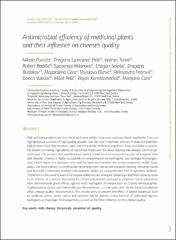Antimicrobial efficiency of medicinal plants and their influence on cheeses quality

View/
Date
2020Author
Puvača, Nikola
Ljubojević Pelić, Dragana
Tomić, Vedran
Radišić, Robert
Milanović, Spasenija
Soleša, Dragan
Budakov, Dragana
Cara, Magdalena
Bursić, Vojislava
Petrović, Aleksandra
Vuković, Gorica
Pelić, Miloš
Konstantinović, Bojan
Carić, Marijana
Metadata
Show full item recordAbstract
Milk and dairy products are the oldest and most widely consumed nutritious foods worldwide. They are
highlighted as a source of high-quality proteins and the most important sources of bioactive peptides.
Milk proteins have high nutritive value and remarkable medicinal properties. They are known as potential
health-promoting ingredients of functional foods, and the dairy industry has already commercialized
many milk proteins and peptide-based products which can be consumed as part of a regular daily
diet. Besides, cheese is highly susceptible to contamination by pathogenic and spoilage microorganisms,
which results in a decrease in its shelf life and cause serious risks to the consumers’ health. Nowadays,
the food industry is continuously becoming more specialized towards meeting consumer needs
and demands. Consumers demand safe products, which are also preferably free of synthetic additives.
Therefrom to the need to search for natural additives has emerged. Botanicals and their extracts came
to an interest as a natural alternative for cheese preservation and quality enhancer. Some substances
have demonstrated good effects against most pathogens of cheese such as Listeria monocytogenes,
Staphylococcus aureus, and Salmonella spp. Nevertheless, it is not quite clear do the botanical addition
affect cheese quality characteristics. This review aims to present the effect of added botanicals such
as medicinal plants, herbs, spices and essential oils to cheeses in the function of protection against
pathogens and spoilage microorganisms, as well as for their influence on the cheese quality.
